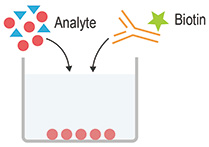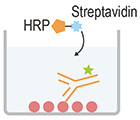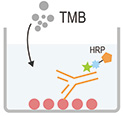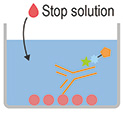4-HNE(4-Hydroxynonenal) ELISA Kit
SKU: E-EL-0128
4-HNE(4-Hydroxynonenal) ELISA Kit
| Detection Range | 0.63-40 ng/mL |
| Sensitivity | 0.38 ng/mL |
Product Details
Properties
| Assay type | Competitive-ELISA |
| Format | 96T |
| Assay time | 2.0h |
| Detection range | 0.63-40 ng/mL |
| Sensitivity | 0.38 ng/mL |
| Sample type &Sample volume | serum, plasma and other biological fluids; 50μL |
| Specificity | This kit recognizes 4-HNE in samples. No significant cross-reactivity or interference between 4-HNE and analogues was observed. |
| Reproducibility | Both intra-CV and inter-CV are < 10%. |
| Application | This ELISA kit applies to the in vitro quantitative determination of 4-HNE concentrations in serum, plasma and other biological fluids. |
Test Principle
This ELISA kit uses the Competitive-ELISA principle. The micro ELISA plate provided in this kit has been pre-coated with 4-HNE. During the reaction, 4-HNE in the sample or standard competes with a fixed amount of 4-HNE on the solid phase supporter for sites on the Biotinylated Detection Ab specific to 4-HNE. Excess conjugate and unbound sample or standard are washed away, and Avidin-Horseradish Peroxidase (HRP) conjugate are added to each micro plate well and incubated. Then a TMB substrate solution is added to each well. The enzyme-substrate reaction is terminated by the addition of stop solution and the color turns from blue to yellow. The optical density (OD) is measured spectrophotometrically at a wavelength of 450 nm ± 2 nm. The concentration of 4-HNE in tested samples can be calculated by comparing the OD of the samples to the standard curve.
Kit Components and Storage
An unopened kit can be stored at 2-8℃ for 1 month. If the kit is not supposed to be used within 1 month, store the components separately according to the following conditions once the kit is received.
| Item | Specifications | Storage |
| Micro ELISA Plate(Dismountable) | 96T: 8 wells ×12 strips | -20℃, 6 months |
| 48T: 8 wells ×6 strips | ||
| Reference Standard | 96T: 2 vials | |
| 48T: 1 vial | ||
| Concentrated Biotinylated Detection Ab (100×) | 96T: 1 vial, 120 μL | |
| 48T: 1 vial, 60 μL | ||
| Concentrated HRP Conjugate (100×) | 96T: 1 vial, 120 μL | -20℃(Protect from light), 6 months |
| 48T: 1 vial, 60 μL | ||
| Reference Standard & Sample Diluent | 1 vial, 20 mL | 2-8°C, 6 months |
| Biotinylated Detection Ab Diluent | 1 vial, 14 mL | |
| HRP Conjugate Diluent | 1 vial, 14 mL | |
| Concentrated Wash Buffer (25×) | 1 vial, 30 mL | |
| Substrate Reagent | 1 vial, 10 mL | 2-8℃ (Protect from light) |
| Stop Solution | 1 vial, 10 mL | 2-8℃ |
| Plate Sealer | 5 pieces | |
| Manual | 1 copy | |
| Certificate of Analysis | 1 copy |
Technical Data:
Precision
Intra-assay Precision (Precision within an assay): 3 samples with low, mid range and high level 4-HNE were tested 20 times on one plate, respectively.
Inter-assay Precision (Precision between assays): 3 samples with low, mid range and high level 4-HNE were tested on 3 different plates, 20 replicates in each plate.
| Intra-assay Precision | Inter-assay Precision | |||||
|---|---|---|---|---|---|---|
| Sample | 1 | 2 | 3 | 1 | 2 | 3 |
| n | 20 | 20 | 20 | 20 | 20 | 20 |
| Mean (ng/mL) | 1.90 | 5.40 | 18.00 | 1.90 | 5.80 | 19.10 |
| Standard deviation | 0.10 | 0.20 | 0.60 | 0.10 | 0.30 | 0.60 |
| CV (%) | 5.26 | 3.70 | 3.33 | 5.26 | 5.17 | 3.14 |
Recovery
The recovery of 4-HNE spiked at three different levels in samples throughout the range of the assay was evaluated in various matrices.
| Sample Type | Range (%) | Average Recovery (%) |
|---|---|---|
| Serum(n=8) | 89-102 | 94 |
| EDTA plasma(n=8) | 91-107 | 99 |
| Cell culture media(n=8) | 92-106 | 100 |
Target Information
| Research Area | Neuroscience, Cell Biology, Metabolism |
Assay Procedures
 |
1. Add 50μL standard or sample to the wells, immediately add 50μL Biotinylated Detection Ab working solution to each well. Incubate for 45 min at 37°C |
 |
2. Aspirate and wash the plate for 3 times |
 |
3. Add 100μL HRP conjugate working solution. Incubate for 30 min at 37°C. Aspirate and wash the plate for 5 times |
 |
4. Add 90μL Substrate Reagent. Incubate for 15 min at 37°C |
 |
5. Add 50μL Stop Solution |
 |
6. Read the plate at 450nm immediately. Calculation of the results |



